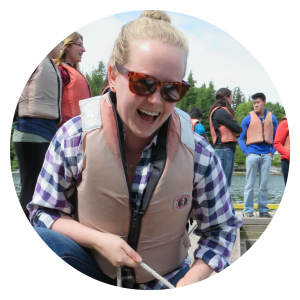Hometown (Nation): Scarborough, ON
Graduated: May 2011
Degree Specialization: FNIS Major, French Major
Research Practicum Topic: Integrating Aboriginal content, culturally relevant pedagogies, and bilingual resources into classrooms
Initially, I was not aware of the existence of FNSP at UBC. I kind of fell accidentally into First Nations Studies. I originally moved to Vancouver to study marine biology, but after a year of unsuccessful studies in the UBC Faculty of Science, I felt disheartened and disconnected from the purpose of attending university. The real story goes that I was burning my chemistry notes on Wreck Beach, when a complete stranger sharing the bonfire with me suggested that, if I was looking to change Faculties, I should consider the First Nations Studies Program, so I did. I registered for FNSP200, which at the time was the 6-credit introductory course, and within the first few weeks of this class I realized that my entire educational career up until that point had been completely void of Aboriginal content and perspective. This especially hit home when I learned about Residential Schools for the first time. Hearing stories told by Chief Robert Joseph and the Indian Residential School Survivor Society representatives filled me with anger and disbelief that I had never heard of this aspect of Canadian history before, and it was at that moment that I decided to commit to learning about Canada’s colonial past, and to understand how I, as a non-Aboriginal person, could contribute to the decolonization of Canadian society.
I benefitted from FNSP in the sense that my entire perspective on Canadian history and social identity has been affected by what I learned through FNSP. Gaining insight into the multitudes of histories and identities that are inscribed in the landscape of Canada has changed how I understand my relationship to the places that I inhabit. I have experienced a fundamental shift in what it means to be Canadian, and continually develop my understanding of the relationships I share with Aboriginal peoples as I move through the land. At first, it was unsettling to become aware that I had only ever learned one side of Canadian history, but I now understand that I have a role to play in raising awareness of colonial histories and Aboriginal/non-Aboriginal relations.
There were many aspects of the Program that I appreciated. To name a few, I loved the intimate class setting, and the emphasis on community-based research. It was such a unique experience being able to work beyond the classroom walls. The skills I developed through conducting my own research project definitely contributed to my success as a graduate student, as I was well-versed in ethics applications and the processes involved in developing a research project. Further, I really appreciated the flexibility in the elective courses and the ability to take a more interdisciplinary approach to my studies.
The Program has absolutely influenced my career path. I am pursuing a career in public education, with the hopes of working in public programming on Aboriginal cultures, and the relationships shared between Aboriginal and non-Aboriginal peoples.
 Faculty of Art
Faculty of Art
